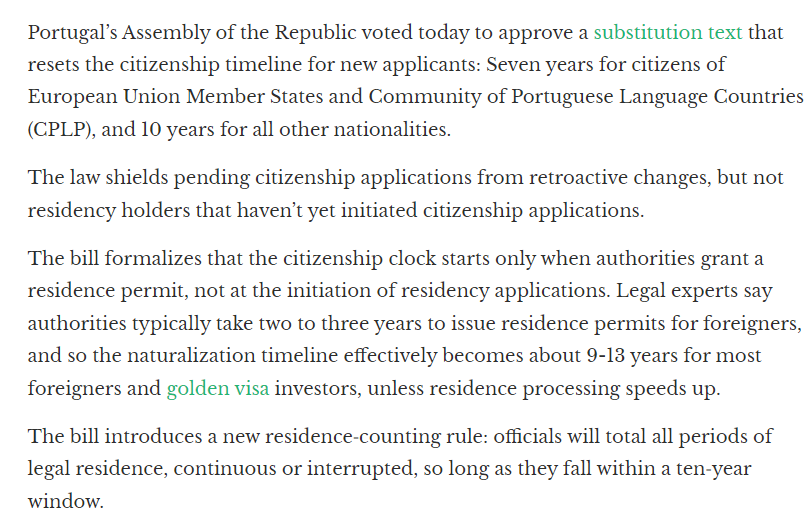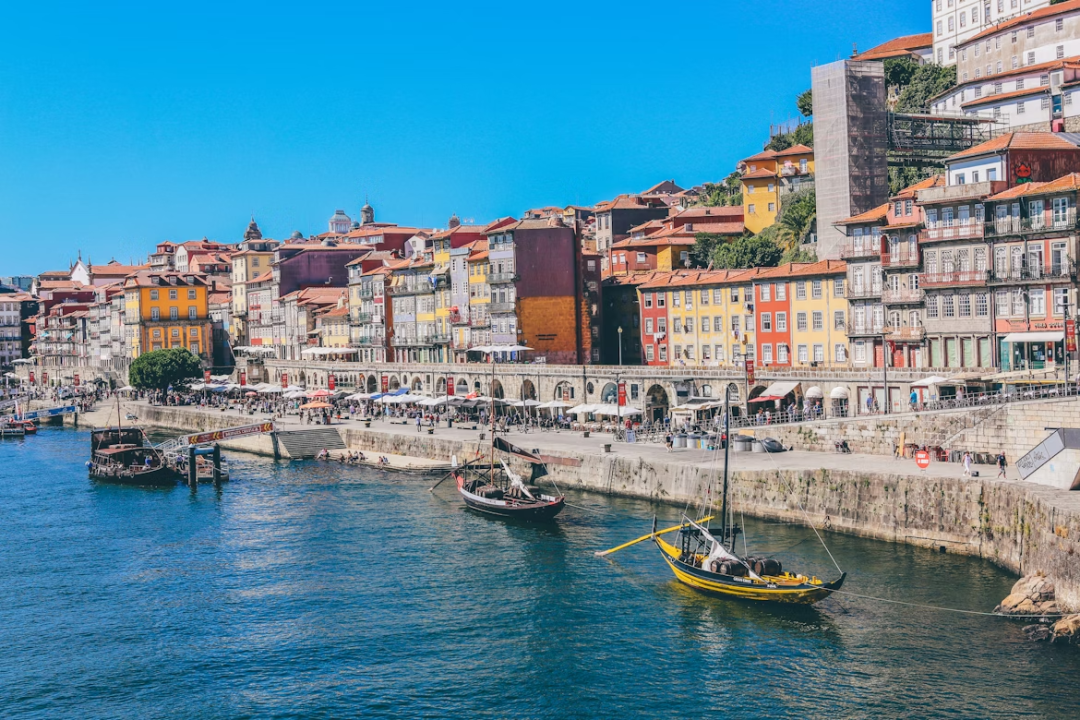
It is reported thaton October28th,local time in Portugal, the Revised Law on Portuguese Nationality, which has attracted the attention of immigrants and identity planners around the world,was formally passed by the Parliamentwitha majority ofnearly70%of the votes.
One of the core changes of this amendment is toextend the residency period required for naturalization from5to10years!This initiative completely rewritesthe history ofPortugal as the“fastest naturalizing country in Europe“and will also profoundly affect the future layout of European identity.

I. Amendment of the law on the ground:
Portugal opens“10-year naturalization era“
In a parliamentary vote onOctober28th, the amendment to the Portuguese nationality lawwas passedwitha majority ofabout70%.This means thatthe naturalization cycle in Portugal will be lengthened across the boardfrom the date the new law comes into force, another manifestation of the tightening trend within the EU system.

Source: DN Daily News, Portugal
1. Official extension of the period of naturalization
The part of the amendment that has received the most attention is the extension of the number of years of legal residence required for naturalization:
Citizens ofthe Community of Portuguese-speaking Countries (CPLP) and EU Member States:extendedfrom5to7years;
Citizens of other countries (including China, the United States, the United Kingdom, Turkey, etc.):extendedfrom5to10years.
In the past, Portugal by virtue of“5years of residence+relaxed conditions“has become a popular first choice for investment immigration in Europe. After the amendment of the law, this competitive advantage will be significantly weakened.
2. Increased thresholds of conduct and penalties
The new law specifies thatthose whohave been sentenced to a prison term oftwoyears or more will be disqualified from naturalization.
This provision strengthensthe “character criterion“for naturalizationand is in line with the importance that EU countries place on the integrity and social responsibility of applicants.
3. Intensive language and culture testing
The amendment requires applicants to pass an official Portuguese language exam (usually atA2level) and demonstrate a basic knowledge of Portuguese history, culture and national symbols. This means that applicants who previously relied on intermediaries or formalized learning will have to make a more substantial effort.
4. Institutionalization of proof of financial capacity
Applicants are required to provide proof of stable and legal financial resources in order to prove their ability to live independently in Portugal. This provision is intended to excludethe phenomenon of“paper residence“and“false settlement“.
5. Tightening of conditions for naturalization by birth
The amendment also raisesthe threshold for“naturalization by birth“.In the future,children will be able to acquire Portuguese nationality by birthonly ifat least one of their parents has been legally resident in Portugal forfiveyears.This change will significantly reducethe number of cases of“short stay+birth on arrival“acquiring citizenship.
6. The starting point for naturalization has not yet been finalized.
It is worth noting that Portugal had previously proposed that the length of residence should be calculated from the“date of issuance of the residence card“, but this key provisionhas not been reiteratedin the latest version of the bill.
The final point of calculation (whether it is based on the issuance of the residence card or the actual entry and residence) is still to be confirmed by the official legal text in the Official Journal of the Republic.

Source:portugal.gov

II. Comparison of the old and new bills:
Core changes in one table

*Click on the large image for details
Thus, the overall direction of the new law is tochangefrom“loose and workable“to“strict compliance“. In the future, the path to obtaining EU status in a shorter period of time will become more and more limited.

(c) The process of amending the law is not complete:
It is still a policy“window period“.
Although the Parliament has completed its vote, the process of amending the law has not been fully completed and is still subject to presidential review and assessment by the Constitutional Court.
1. Two possible directions
①Passed with the signature of the President
Once signed by the President, the bill willbe officially publishedin theDiário da Repúblicaandwill enter into force the following day. At that time, all applications for naturalization will be made in accordance with the new regulations.
②Rejected by the President or sent to the Constitutional Court for review
If the President finds that there are doubts about the constitutionality of the provisions of the amendment, he or she may return the proposal to the Parliament or send it to the Constitutional Court for review. In this case, the effective date of the bill will be delayed and the currentfive-year naturalization policy will remain in effect.
2. Critical window: those who act now can still benefit
Specialized immigration attorneys have pointed out that there is currently acritical transition period where“the amendments have been passed but have not yet come into effect“.
During this period, allapplicants whohave met or are about to meet thefive-year residency requirement should immediately submit an application for naturalization in order to lock in the old law benefits.
Once the President signs and the new law is published,the 5-Year Naturalization policy will be terminated immediately and unfiled applications will be automatically included in the new regulations.
The point: catch the last train!
In other words, the amendment to the Citizenship Act is still under critical review, andthe 10-year naturalization bill has not yet come into effect!
Investors who submit their citizenship application at this stage still enjoy the5-year naturalization policy.

Source: Internet, deleted

IV. Professional advice:
How to respond to policy changes
1. Act now to take up the old law quota
If you have stayed in Portugal for5yearsorwill meet the requirements in a few months, you shouldsubmit your application for naturalization as soon as possible.
The Portuguese judicial system has a long processing time andthe “date of submission” ofthe applicationwill be the basis for the determination. As long as the application is submitted within the validity period of the old law, it will beprocessedaccording to the5-year rule.
2. Prepare complete documentation to minimize the risk of rejection
Applicants should ensure that materials are complete and logically clear, including:
Residence permits and proof of continuous residence;
Proof of financial ability such as tax returns or bank statements;
No criminal record and good character documents;
Certificate of passing thePortugueseA2exam.
The lawyer emphasized that the official standards of review vary slightly from region to region in Portugal, and thatearly preparation can significantly reduce the risk of backdating.
3. Adaptable planning for long-term investors
Forthose whohave not yet reached the naturalization age, but already hold aGolden VisaorD7visa, they can be rearranged according to the new law cycle:
The core of the program is“Long-term Residency+Educational Resources+Tax Planning“;
Also deploy alternate identities in other regions (e.g., Greece, Spain, or the Caribbean);
Rationalize the duration of stay and avoid consecutive departures beyond the legal limit.
4. Pay close attention to the timing of presidential signings and communiqués
The general opinion of the legal team is that the bill couldbe officially publishedas early as thefirst quarter of2025. Applicants are advised to pay regular attention to announcements in the Portuguese Official Gazette of the Republic and on the official website of the Presidency.

Source: Internet, deleted

V. Why is Portugal also“tightening“?
Portugal’s law change is not an isolated event, but a continuation of the overall tightening in Europe.
Since2020, the European Commission has repeatedly warned member states to limit the“Citizenshipby Investment“(CBI) and“Residence by Investment“(RBI) programs to prevent money laundering and tax evasion risks.
1. Overall tightening of European identity policies
Greece: raising the golden visa threshold to800,000 euros;
Spain: plans to phase out the Golden Visa program;
Malta: Increased substantive residency requirements and stricter due diligence mechanisms;
Cyprus:The Citizenship by Investment Programhas beenterminatedin 2020.
Portugal’s adjustments mean that there is no longera “fast track” tocitizenshipwithin the EU.
2. Domestic political pressure in Portugal
Portuguese public opinion has long criticized the Golden Residence policyas “benefiting the rich“, while the pressure on ordinary people to buy a home and find a job has increased. To a certain extent, the amendment responds tothe political demands for“equity and social inclusion“.
The new law emphasizes language, economy, self-sufficiency and integrity, and also reflectsthe trend towards“localization and long-term“identity planning.

Image source: YouTube

VI. New directions for future identity planning
1. Portugal remains attractive in the medium to long term
Despite the extended naturalization cycle, Portugal remains one of the most cost-effective status options in Europe.
Advantages include:
Stable legal system and social environment;
Free passage in the Schengen area;
Quality education and healthcare system;
Expat friendly and flexible tax regime (NHRpolicy is still in the implementation stage).
Portugal remains a high-quality option for families seeking long-term residency, European education and retirement resources.
2. Multi-country portfolio status planning
As the Portuguese cycle lengthens, more and more HNWIs are opting fora **Dual IdentityStrategy**:
Portugal or Greece as an EU Residence Corridor;
Also configure Caribbean passports (St. Lucia, Dominica, Antigua, etc.) for global travel and asset convenience.
Thisdual-layout model of“residence+passport“has become a new trend.

Image source:unsplash
Conclusion: Times have changed, act fast!
The end ofPortugal’s5-year naturalization policy marksthe end of the era of liberal naturalization in Europe.
The 10-year naturalization period means that the future of status planning will be more focused on“real residency, linguistic integration and long-term planning“.
However, until the new law comes into force, the current5-year policy is still valid.
For applicants who are already residing in Portugal or who are about to fulfill the conditions,this is the golden window for the final push.
Suggested Summary:
For those whohave completed5years: submit your naturalization application immediately, locking in the old law;
For those whoare about to complete5years: prepare your documents as soon as possible;
Newly-acquired residents: planning ahead forthe10-year cycle and long-term tax structure;
New applicants: consider a multi-country portfolio layout to diversify policy risk.
The road to naturalization in Portugal has become longer, but the opportunities are still there. In times of policy change,action is always better than watching.
*References from:portugal.gov,SEFPortugal,DNNews Daily, composite news reports collated, reprinted with attribution, infringement and deletion of contact.
…
👇 Plus V enters Singapore’s largest outbound community 👇

Past Recommendations

